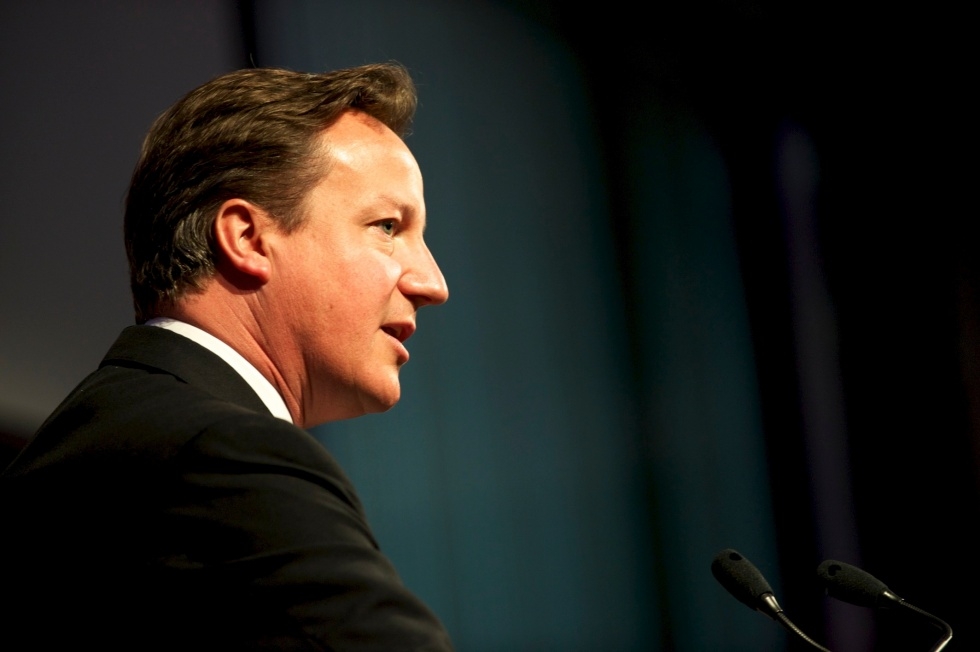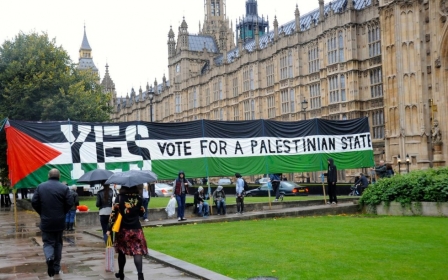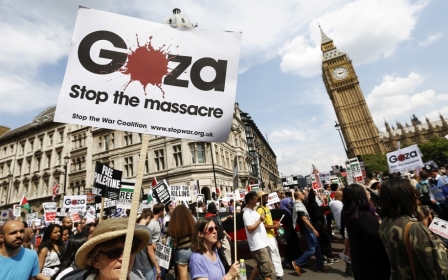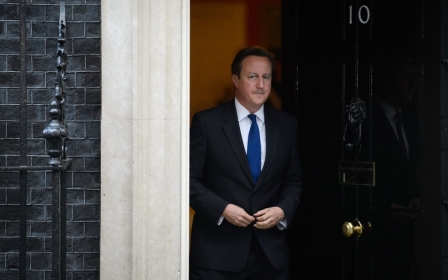Will Britain's election make any difference for Palestine?

Support for Israel has been hardwired into Britain's ruling elite.
Both of the two parties vying to form - or more realistically, dominate - the next government bear responsibility for the suffering inflicted on the Palestinians. In 1917, the Conservatives' Arthur James Balfour made a formal commitment, as foreign secretary, towards ensuring that the Zionist colonisers of Palestine would be accorded greater privileges than its indigenous population. Labour's 1944 conference effectively gave its blessing to the forced displacement of 750,000 Palestinians that took place four years later; a statement approved by delegates read: "let the Arabs be encouraged to move out as the Jews move in".
David Cameron has proven to be a capable custodian of Balfour's toxic legacy. Addressing the Knesset in 2014, Cameron boasted of how he had protected Israeli war criminals by gutting a "universal jurisdiction" law that left them vulnerable to arrest while visiting the UK.
Cameron has occassionally cited his devotion to Israel when trying to score points against his rivals. "Unlike Labour, we in this party oppose boycotts," he told the annual "business lunch" hosted by the lobby group Conservative Friends of Israel last December.
The inference that Labour has been hijacked by far-left Palestine solidarity activists probably went down well among Tory stalwarts. Yet it was wildly inaccurate. David Cameron and Ed Miliband have adopted almost identical positions towards Israel.
True, the two men have criticised Israel on occasion. Cameron has described Gaza as a "prison camp". Shortly after becoming the Labour leader, Miliband argued that the siege of Gaza "must be lifted and we must strain every sinew to work to make that happen".
Miliband's muscles quickly went limp. Instead of striving to end the blockade, he has been cosying up to the state which imposes it. A "major priority" for a Labour government would be to "further collaborate" with the "economic powerhouse" of Israel, he has pledged.
Contrary to what Cameron has alleged, Labour has refused to heed Palestinian calls for robust action against Israel. Ed Balls, the shadow chancellor, has said: "We have no truck with stand-offs and boycotts."
Labour's vote in favour of recognising a sliver of historic Palestine as a state was a derisory response to the massacres Israel carried out in Gaza last summer.
Israel had previously attacked Gaza in November 2012. Less than a year later, Labour bigwig Jim Murphy visited the Middle East to discuss how Britain's military cooperation with Israel could be deepened.
Most, if not all of Labour's front bench have pandered to the Zionist lobby. Taking part in activities organised by Labour Friends of Israel (LFI) appears to have become mandatory for the party's most ambitious representatives. As the book Blair Inc. explains, there is considerable overlap between LFI and efforts to weaken Labour's bonds with trade unions. LFI activists have been prominent in Progress, the pressure group dedicated to keeping Labour on a Blairite track.
Although Tony Blair may be viewed as a liability by Labour's rank-and-file, his words have been quoted approvingly by Douglas Alexander, the shadow foreign secretary, during LFI gatherings. Such reverence towards a man widely reviled by ordinary Britons (and across the world) contradicts the perception Miliband wishes to create of Labour having learned from Blair's "mistakes" - as if the illegal invasion of Iraq was no more than a strategic blunder.
About the only evidence Miliband can point to in this regard is that he helped thwart a planned offensive against Syria. The same Ed Miliband backed NATO's war against Libya in 2011. That attack was motivated by a desire to keep Middle Eastern and African resources under Western control. Predictably, its consequences have proven disastrous for people in Libya and its neighbouring countries.
As an Irishman, I have no intention of advising my British friends on how they should vote next week. Rather, I am seeking to highlight how an imperial mindset still pervades the British establishment. It will take much more than an election to change that mindset.
Having the Scottish National Party as part of a coalition government might be symbolically important, but it is unclear how much difference it will make. Scotland's foreign minister urged an arms embargo against Israel last year. But would the SNP really act to prevent Raytheon, the huge arms company, from making "smart bomb" components at its plant in Fife? Would it be prepared to put ethics before investment?
Solemn declarations by opposition parties frequently become meaningless once they have a whiff of power. The Liberal Democrats similarly called for the suspension of weapons sales to Israel before the 2010 election. That did not stop their intellectual guru Vince Cable from authorising British companies to keep selling Israeli weapons when he became business secretary.
Britain's endorsement of Israeli crimes has arguably become more enthusiastic over the past few decades. Margaret Thatcher condemned the 1982 massacres of Palestinian refugees by Israel's proxy forces in Lebanon as an "act of sheer barbarism". More than 2,200 people were murdered by Israel in Gaza last summer; at least 547 of them were children. In an interview for the latest issue of The Jewish Chronicle, David Cameron tries to spin all that slaughter as an act of self-defence.
The recent cancellation by Southampton University of a conference critical of Israel is symptomatic of attempts to smear Palestine solidarity campaigners. Michael Gove, the government chief whip, has accused the Palestinian-led movement for boycott, divestment and sanctions (BDS) against Israel of being a "new outlet for the poisonous virus of anti-Semitism".
If Gove bothered to do a little research, he would find that the BDS movement rejects all forms of racial and religious discrimination. That is what makes it different from the state of Israel, which remains wedded to the concept that some human beings are more valuable than others.
Zionism, the ideology on which Israel was built, was heavily influenced by British colonialism. Max Nordau, a founder of the World Zionist Organisation, once stated: "We will endeavour to do in the Near East what the English did in India. It is our intention to come to Palestine as the representatives of culture and to take the moral borders of Europe to the Euphrates."
Why does the British establishment denounce Palestine solidarity campaigners in vitriolic terms? One reason may be that many campaigners repudiate the myths that the establishment wishes to propagate.
Used intelligently, the tactics of BDS can be a powerful tool towards raising awareness about how the West shores up Israel's apartheid system. As Britain was instrumental in creating that system, nobody should be surprised that its elite wants to conceal the truth.
- David Cronin is a journalist and activist living in Brussels. He is the author of Europe's Alliance With Israel: Aiding the Occupation (Pluto, 2011). His most recent book is Corporate Europe: How Big Business Sets Policies on Food, Climate and War (Pluto, 2013).
The views expressed in this article belong to the author and do not necessarily reflect the editorial policy of Middle East Eye.
Photo: British Prime Minister David Cameron (Wikimedia Commons)
New MEE newsletter: Jerusalem Dispatch
Sign up to get the latest insights and analysis on Israel-Palestine, alongside Turkey Unpacked and other MEE newsletters
Middle East Eye delivers independent and unrivalled coverage and analysis of the Middle East, North Africa and beyond. To learn more about republishing this content and the associated fees, please fill out this form. More about MEE can be found here.





